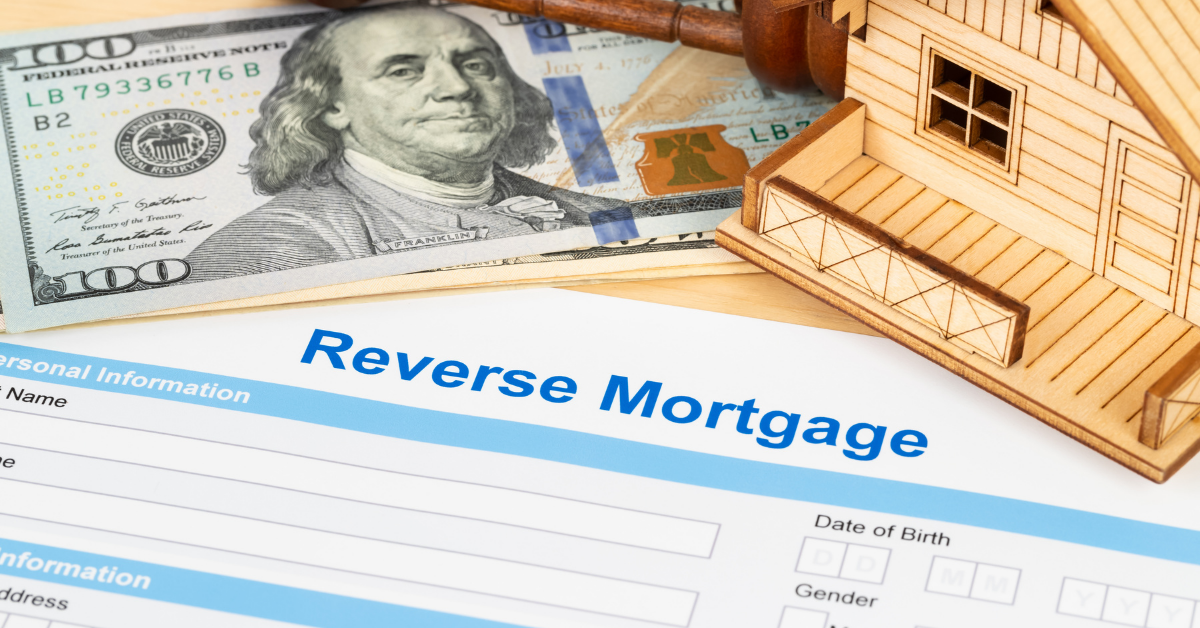Reverse Mortgages: What They Are and If They’re Right for You
April 27, 2023
Reverse Mortgages: What They Are and If They’re Right for You
April 27, 2023
Share this post:

Millions of Americans are entering retirement encumbered with mortgages. The proportion of homeowners aged 65+ who still carry a mortgage doubled over the last 30 years—from 21% in 1989 to 42% in 2019. The median loan balance increased to $86,000 in 2019 from $18,000 in 1989. Lastly, and maybe more concerning, over a quarter of seniors 80+ still carry mortgage debt (compared to only 3% in 1989). All of this while the state of American retirement savings is declining. According to epi.org, almost half of American families have no retirement savings account. Period. A reverse mortgage can be a way to further fund your retirement if have considerable equity in your home. You can access cash tied up in your home’s equity to pay for living expenses as you age, especially if you have depleted or will deplete your savings or other sources of retirement income. These loans, of course, have their advantages and disadvantages and may not be right for everyone’s situation. Read on for more details and to evaluate the pros and cons of this type of loan, so you can make an informed decision before jumping in.
What Is a Reverse Mortgage?
To discuss reverse mortgages, we must first address what equity means. Equity is the market value of your property less any loans still owed. For example, if the market value of your home is $1,000,000 and you have an existing loan for $350,000, the equity equals $750,000—also the amount you may be able to borrow with a reverse mortgage. If you house if fully paid off (no remaining mortgage), the market value of your home equals the equity you have available.
A reverse mortgage, in the most basic sense, is a loan. It allows you to cash in the equity on your primary residence without selling it or making a monthly loan payment (in general). You still live in the house you’re taking a reverse mortgage out on. If you’re 62 years or older and have substantial equity (generally 50% or more) in your home, you may be eligible for a reverse mortgage. You must own your home outright or have at least 50% equity in your home; you also cannot have more than one lien on your house, so you cannot have both a mortgage and home equity line of credit or other loan out on the house. The loan’s requirements may include that you have to pay off your existing mortgage with the reverse mortgage funds if you don’t own your home outright.
Think of this as the—pardon the pun—reverse of a traditional mortgage in which you, the lender, pay the bank. Unlike a traditional (forward) mortgage, you generally don’t make loan payments with a reverse mortgage; the bank pays you. You can borrow against the equity in your home and receive the funds as a lump sum, monthly payment, or credit line, with your home being the collateral for the loan. Common reasons for obtaining a reverse mortgage are to supplement your retirement income, perform home repairs, or pay medical costs.
How Does a Reverse Mortgage Work?
To obtain a reverse mortgage, you’ll need to work with a bank or other reputable lender. You apply to take out a reverse mortgage; the lender will run a credit check, generally do an appraisal and review the property title and appraised value, and may evaluate your creditworthiness and financial standing using other eligibility requirements. If approved, the lender will issue payments in either a lump sum, monthly payments, credit line, or some combination thereof. The loan amount will vary depending on many factors, including which type of reverse mortgage you obtain, the current market value of your home, interest rates, and other loan costs.
Federal regulations require that the loan is not larger than the home’s value and that if the loan balance exceeds the home’s value, the borrower (or their estate) is not responsible for paying the difference. If you obtain a government-backed loan, you’ll be required to undergo an informational session with a reverse mortgage counselor. If you’re married, it’s important that both you and your spouse are listed as co-borrowers on the mortgage; this will ensure that the living spouse can continue to live in the home and continue to hold the mortgage if the other dies or has to move out for medical reasons.
You usually receive the funds tax free, generally without affecting your Social Security or Medicare benefits, but the interest continues to build over the life of the loan. This means that the lender’s debt increases while the home’s equity decreases over time. Reverse mortgages also often have higher interest rates than traditional mortgages. You’re also required to pay fees and other closing costs in addition to mortgage insurance premiums. These fees and other costs can come out of the loan funds (versus paying out of pocket), but doing this will reduce the final amount you receive after closing. Mortgage insurance is intended to protect the lender in the case of default (which can go beyond a traditional mortgage’s default of failing to make monthly payments and includes failing to pay property taxes or mortgage insurance premiums or failing to maintain/upkeep your property).
The funds must be repaid, including the accrued interest, principal, mortgage insurance, and any other fees, in full when you sell the home and/or move out, default on the loan obligations, or pass away. If you sell the home for more than the mortgage’s balance, you (or your estate if you’re deceased) receive the remaining funds.

You can receive the funds from a reverse mortgage in a variety of ways:
- Lump sum payment – receive all the funds of the reverse mortgage in full in one payment; this type of mortgage is the only option with a fixed interest rate
- Equal monthly payments – payments are received monthly at a fixed rate with a variable interest rate
- Term payments – payments of equal amounts are received for a set time period
- Line of credit – the homeowner can borrow funds (up to a certain amount) at times of their choosing as needed; interest is only paid on the borrowed funds
- Equal monthly payments and a line of credit
- Term payments and a line of credit
Reverse Mortgage Types
- Home equity conversion mortgage (HECM)
- This loan allows you to use the equity in your home to convert it to cash. Lenders must be approved to offer FHA loans, which are insured by the Federal Housing Administration (FHA). This loan is regulated by the U.S. Department of Housing and Urban Development. Homes must be appraised, and the mortgage value is based on this appraisal (along with other FHA limits). You are required to insure and pay for this type of loan using a mortgage insurance premium.
- Home equity conversion mortgage (HECM) for purchase
- This FHA-insured loan allows those 62+ to use reverse mortgage funds to purchase a new primary residence. HECM for purchase loans offer flexible repayment options—meaning you can make monthly payments of an amount of your choice or make no monthly payments. There are requirements for the minimum down payment amount of the new principal residence, which will vary based on your credit and financial history and other demographics.
- Proprietary reverse mortgage
- This type of loan is offered by private lenders, often used for loans for homes that exceed HUD limits. These loans often have higher interest rates than federally-regulated loans.
- Single-purpose reverse mortgage
- This type of loan is offered by local and state government agencies and non-profits and must be used for specific purposes, like paying off property taxes or renovating your home. Single-purpose reverse mortgages often have lower fees and interest rates.
Fees & Costs of a Reverse Mortgage
According to HUD, you’ll pay several fees and other costs upon closing. Again, you can pay for these out of the loan funds instead of paying out of pocket, but doing so reduces the loan amount available to you. HECM mortgages have caps for fees and standard interest rates for MIPs.
- Mortgage insurance premium – you’ll pay this both initially and annually
- Origination fees – this is compensation to the lender for processing your loan
- Servicing fees – these fees cover the costs of sending you statements, disbursing the loan funds, and other account administration and maintenance services
- Third-party charges for closing costs – third parties may charge additional fees at closing (e.g., for an appraisal and credit check)
You’ll still have to pay your property taxes and homeowners insurance on time and maintain your home in good condition. Interest will continue to accrue for the life of the loan.
Pros & Cons of Reverse Mortgages
Taking out a reverse mortgage is a serious financial decision with many considerations to take into account before proceeding.
Reverse Mortgage Pros
- Can be a good way for some to turn the equity in your home into cash that can be used for medical, retirement, and/or living expenses
- You can roll all costs and fees into the loan
- Allows you to remain in your home and keep the title
- You’ll (have to) pay off your traditional mortgage with the reverse mortgage funds, so you’ll no longer have a house payment
- No payments on a reverse mortgage until you sell/move or pass away
- Flexibility on how you receive the funds (lump sum, monthly payments, etc.)
- Government-sponsored HECMs are non-recourse loans, meaning you won’t pay more than the value of the home
- Reverse mortgages are non-taxable and not considered income
- You can cancel the reverse mortgage in the first three business days after closing if you change your mind
- By listing your spouse as co-borrower, they can stay in the house if you pass away first
- No impact on your Social Security and Medicare benefits
Reverse Mortgage Cons
- Fees and other costs associated with reverse mortgages can be high and will reduce the net funds you receive
- You have to pay mortgage insurance premiums while you hold the loan
- You need to maintain the house in good condition
- Default and/or foreclosure can happen if you fall behind or fail to pay your property taxes or insurance
- Can affect your Medicaid and Supplement Security Income eligibility and benefits if you elect the lump sum payment option and do not spend the funds after 30 days as these are income-based benefits
- If you have to move out of the house or upon your death (and your spouse’s death if they are a co-borrower), the loan becomes due immediately
- Complicates your heirs’ ability to inherit your property as they’re required to pay off the balance of the reverse mortgage or 95% of the home’s worth (whichever is higher) to transfer ownership
- Reverse mortgages significantly reduce the remaining equity in your home as interest and other fees accrue
- You could still outlive your reverse mortgage funds

Finding the Right Reverse Mortgage for You
Once you’ve considered the pros and cons and if you decide to proceed with a reverse mortgage, do your due diligence and shop around. There are several types of reverse mortgages (see above) from government-sponsored and private lenders with different terms, fees, and options. Do your research and work with a HUD counselor to evaluate your options and get your questions answered. You can locate a HUD-approved counselor or agency here or call 1-800-569-4287 to use HUD’s interactive voice system. Make sure you understand all the fees and extra costs you may incur with each mortgage and lender.
Reverse mortgages are often met with skepticism by financial professionals and can be subject to scams or questionable sales practices. Government-approved housing agency representatives can help paint a more accurate picture on the advantages and implications of a reverse mortgage more than a salesperson, who may position a reverse mortgage as a great option for everyone, something that can solve all your problems, provide excess cash with few disadvantages, and so on. Some salespeople will push you to buy other financial products they sell, like annuities. Remember, you do not have to buy anything from them to obtain your reverse mortgage. In summary, do your research, solicit help from reliable sources, and select a reputable lender if you choose to proceed.
Reverse mortgages are complicated financial products. A reverse mortgage can be beneficial for some seniors in need of additional retirement income and who are fully educated and informed on the ins and outs of these loans. Alternatives may be available that would better suit your needs and financial situation, including a home equity loan, cutting your expenses, downsizing or relocating to a less expensive home/city, or refinancing your existing mortgage. A HUD-approved counselor can walk you through your options. Consult your financial professional for other implications on your retirement portfolio.
A reverse mortgage might not be a good option if you have significant savings and/or retirement income that will likely last through your retirement years and/or you wish to pass your property on to your beneficiaries upon your passing. In general, if you are incurring high costs in your retirement years and are at risk of running out of money and you have significant equity in your home or your home has greatly increased in value, you intend to stay in your home for a long time, and you can afford your home costs (like property taxes, insurance, home maintenance), a reverse mortgage could be a good option for you. Weigh this decision carefully before proceeding.
If you want to learn about more personalized and advanced strategies, schedule a 15-minute call with our team.
Schedule Your Complimentary 15-Minute Call
Want expert retirement and investing advice? Subscribe to our YouTube channel and check out our weekly podcast with The Sandman!
Listen to Protect Your Assets anywhere you get your podcasts:
Standard Disclosure
This blog expresses the author’s views as of the date indicated, are subject to change without notice, and may not be updated. The information contained within is believed to be from reliable sources. However, its accurateness, completeness, and the opinions based thereon by the author are not guaranteed – no responsibility is assumed for omissions or errors. This blog aims to expose you to ideas and financial vehicles that may help you work towards your financial goals. No promises or guarantees are made that you will accomplish such goals. Past performance is no guarantee of future results, and any expected returns or hypothetical projections may not reflect actual future performance or outcomes. All investments involve risk and may lose money. Nothing in this document should be construed as investment, tax, financial, accounting, or legal advice. Each prospective investor must evaluate and investigate any investments considered or any investment strategies or recommendations described herein (including the risks and merits thereof), seek professional advice for their particular circumstances, and inform themselves about the tax or other consequences of any investments or services considered. Investment advisory services are offered through Liberty Wealth Management, LLC (“LWM”), DBA Liberty Group, an SEC-registered investment adviser. For additional information on LWM or its investment professionals, please visit www.adviserinfo.sec.gov or contact us directly at 411 30th Street, 2nd Floor, Oakland, CA 94609, T: 510-658-1880, F: 510-658-1886, www.libertygroupllc.com. Registration with the U.S. Securities and Exchange Commission or any state securities authority does not imply a certain level of skill or training.
References
Cetera, Mike, and Bond, Casey. (2021, March 26). 5 Reverse Mortgage Pros And Cons. Forbes. https://www.forbes.com/advisor/mortgages/reverse-mortgage-pros-cons/
Chang, Ellen. (2020, November 25). Everything you need to know about reverse mortgages. Bankrate. https://www.bankrate.com/mortgages/reverse-mortgage-guide/
Consumer Financial Protection Bureau. (n.d.). Reverse Mortgage Loans. https://www.consumerfinance.gov/consumer-tools/reverse-mortgages/
Federal Trade Commission Consumer Information. (2015, June). Reverse Mortgages. https://www.consumer.ftc.gov/articles/0192-reverse-mortgages
Fontinelle, Amy. (2021, May 31). Reverse Mortgage. Investopedia. https://www.investopedia.com/mortgage/reverse-mortgage/
Joint Center for Housing Studies of Harvard University. (2018) Housing America’s Older Adults 2018, www.jchs.harvard.edu/sites/default/files/Harvard_JCHS_Housing_Americas_Older_Adults_2018_1.pdf.
Mayer, Christopher, and Moulton, Stephanie. (2020, September 15). The Market for Reverse Mortgages Among Older Americans. Retirement Income Journal. https://retirementincomejournal.com/wp-content/uploads/2020/10/Research-HECM-Mayer-and-Moutlton-9-20.pdf
Merritt, Jessica. (2021, July 2). How to Find the Best Reverse Mortgage Lender. U.S. News. https://loans.usnews.com/reverse-mortgage
Molinsky, Jennifer. (2020, December 17). Ten Insights About Older Households From the 2020 State of the Nation’s Housing Report. Joint Center for Housing Studies of Harvard University. https://www.jchs.harvard.edu/blog/ten-insights-about-older-households-2020-state-nations-housing-report
Rodriguez, Norma, and Paris, Mayra. (2021, June 25). What Is a Reverse Mortgage and How Does It Work? Money. https://money.com/what-is-a-reverse-mortgage/
Treece, Dock David. (2020, July 24). Reverse Mortgages: How They Work and Who They’re Good For. Forbes. https://www.forbes.com/advisor/mortgages/reverse-mortgages/
